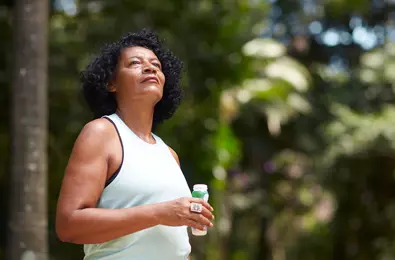Clinical study finds that 35 grammes of whey protein can support muscle synthesis in postmenopausal women
Many women find that they become overweight after the menopause. Although a weight loss diet is often the go-to solution, it is well known that such diets can also lead to muscle loss – at a time when women are already vulnerable to declining muscle mass and strength.
Findings from a clinical study at Aarhus University suggest that a 35 g dose of whey protein could help counter muscle loss in postmenopausal women when dieting to lose weight.
Conducted as part of an industrial PhD in collaboration with Arla Foods Ingredients, the study enrolled 40 women in their late 50s and with a body mass index (BMI) in the overweight range. The objective was to determine the effect of varying whey protein doses on muscle protein synthesis at rest and after exercise following a short-term, energy-restricted diet.
More protein necessary – but how much?
To maintain muscle mass during weight loss, there is already a scientific consensus that daily protein intake should be higher than the current recommendation of 0.8 g per kilo body weight. However, prior to this study, the optimum protein dose for maximum muscle protein synthesis stimulation in middle-aged women had not been investigated.
Against this background, the study set out to determine which whey protein dose – 15 g, 35 g or 60 g – was most effective in a drink.
The 40 women were randomly assigned to one of four groups where they either consumed an energy-restricted or energy-balanced diet for five days. All women on the energy-restricted diet lost weight during this time.
Muscle benefits from whey protein
Muscle protein synthesis was measured on day six following resistance exercise or rest and a whey protein serving. This showed that the drink containing 35 g of whey protein stimulated the best muscle protein synthesis response following an energy-restricted diet – and that the response was similar with or without exercise.
These are useful findings. With more evidence of this kind, the hope is to establish a protein serving recommendation for minimising muscle loss in postmenopausal women during a weight loss programme.
The Journal of Nutrition has published the research paper here.



